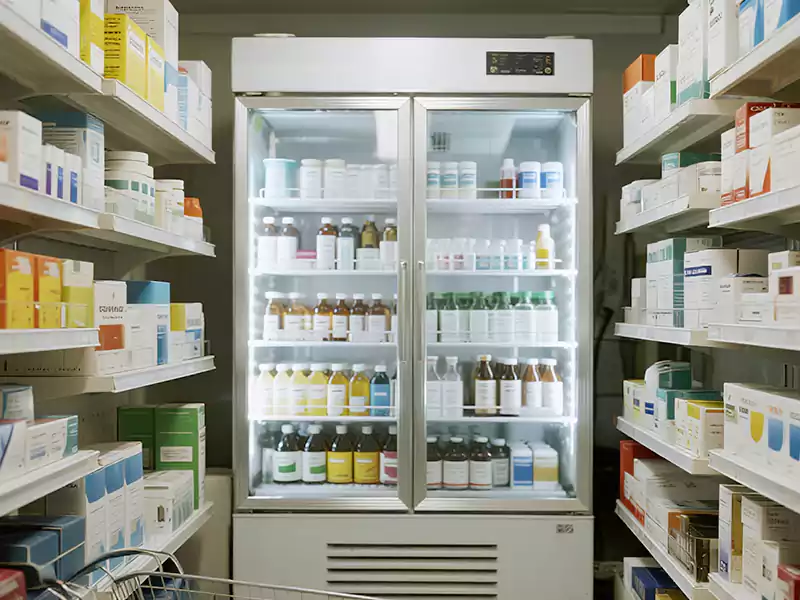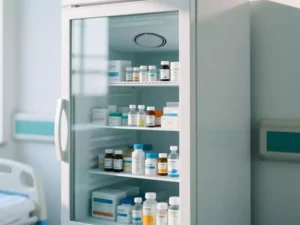When it comes to safe drug storage, temperature matters. The correct medication refrigerator temperature range ensures that sensitive medicines remain stable and effective. In this article, we answer common questions about pharmacy fridge temperature range, drug fridge temperature, and what to do if storage conditions go wrong.

What Is the Normal Temperature for a Medication Fridge?
The normal medication fridge temperature range is +2°C to +8°C (36°F to 46°F). This standard is used worldwide for pharmacies, hospitals, and clinics.
A pharmacy refrigerator is designed specifically to keep medicines within this narrow temperature band. Unlike a household fridge, a medical refrigerator temperature range is controlled with advanced monitoring, alarms, and stable airflow.
For frozen products, the pharmacy freezer temperature is generally between –15°C and –25°C.
What Is the Wrong Temperature for Medication Storage?
Many people ask: “What is considered the wrong refrigerator temperature for medication storage?”
The answer is simple: any temperature outside the recommended +2°C to +8°C range is incorrect.
Too warm (>8°C): Medications may degrade quickly.
Too cold (<2°C): Sensitive formulations like insulin can be damaged by freezing.
Fluctuating temps: Even short-term deviations outside the med fridge temp range may reduce drug effectiveness.
Maintaining the correct pharmacy fridge temperature is therefore essential for safety and compliance.
What Medications Are Temperature Sensitive?
A frequent question from healthcare providers is: “What medications are stored in fridge temperature?” The answer covers a wide range of pharmaceuticals that are highly sensitive to heat, cold, and fluctuations. These drugs must remain within the medication fridge temperature range of +2°C to +8°C to protect their chemical stability and clinical effectiveness.
1. Vaccines
Routine vaccines (such as measles, influenza, polio, and hepatitis) are some of the most temperature-sensitive products.
If exposed to heat above the pharmacy refrigerator temperature range, vaccines may lose potency permanently.
Freezing below 0°C can damage the suspension and render the vaccine unusable.
2. Insulin and Diabetes Medications
Insulin must be stored at the correct drug fridge temperature until opened.
Freezing can cause insulin proteins to denature, while exposure to warmth shortens its shelf life.
Some modern biologic diabetes medications also require strict refrigeration.
3. Biologics and Specialty Medicines
Biologic therapies such as monoclonal antibodies, growth hormones, and fertility drugs rely on complex protein structures.
These are extremely sensitive to fluctuations outside the medical refrigerator temperature range.
Once spoiled, they cannot be restored, leading to patient safety risks and high financial loss.
4. Antibiotics and Ophthalmic Solutions
Certain liquid antibiotics and eye drops specify refrigeration on their labels.
Incorrect medication stored in fridge temperature can reduce effectiveness or increase the risk of bacterial contamination.
5. Cancer and Immunotherapy Drugs
Many oncology treatments are formulated as refrigerated injections or infusions.
If stored outside the correct med fridge temp range, these drugs may lose therapeutic effectiveness.
Key Takeaway: Not all medicines require cold storage, but drugs that require refrigeration must be kept between +2°C and +8°C at all times. Healthcare professionals should always check the manufacturer’s label and guidelines to confirm the appropriate pharmacy refrigerator temperature range.
What to Do If a Pharmacy Fridge Is Out of Range?
Another frequent concern is: “What should I do if a pharmacy fridge temperature is out of range?”
Here’s a step-by-step guide:
1. Verify the Reading
Check the pharmacy refrigerator temperature using a digital data logger.
2. Quarantine the Medicines
Clearly mark and separate affected products.
3. Check Manufacturer Guidelines
Each drug has different stability rules.
4. Document the Event
Record the out-of-range medication refrigerator temperature and corrective actions.
5. Fix the Cause
Service the unit to avoid repeated failures.
This ensures the refrigerator temperature for medication storage remains safe and compliant.
The correct medication fridge temperature is vital for patient safety. The standard pharmacy fridge temperature range of +2°C to +8°C protects vaccines, insulin, and other sensitive drugs from degradation.
By knowing what is normal, what is wrong, which medications are stored in fridge temperature, and what to do when the pharmacy refrigerator temperature range is breached, healthcare providers can ensure safe, reliable, and effective medication storage.







